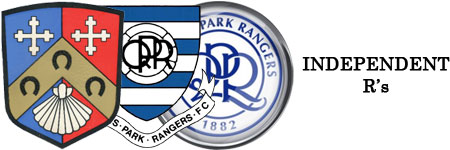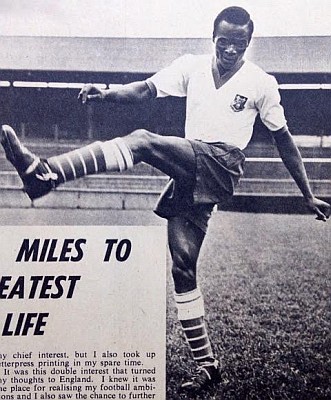The following article appeared in ‘Charles Buchan’s Football Monthly’ in April 1957:
‘It’s a long way from Lagos, Nigeria, to Shepherd’s Bush, London – approximately 4,080 miles – but I’m more than glad I made the journey. Not that my route was direct. Before I was given my big chance with Queen’s Park Rangers, I played first for Peterborough, and then Skegness.
But first I want to tell you of my early football life back home in Nigeria. I was born in Lagos but educated at Port Harcourt, where soccer is a very popular sport. Many of Nigeria’s star players come from there.
I played at outside-right for the St. Mary’s Catholic School. We had a good team, and won the Roger’s Shield, quite a big competition in the area.
When my schooldays were over, I returned to Lagos, and was asked to join the Marine Athletic Club. They already had an outside-right, so I switched to inside-left. Then the club decided that centre-forward might suit my style of play best, and I was given that position.
In my first game at centre-forward I scored three goals against the Police Athletic Club of Lagos, and have stayed in that position ever since. That proved to be quite an important match for me.
The referee that day happened to be the chairman of the Railway Athletic Club of Lagos – I know that’s a circumstance that would never arise here in England! And on his recommendation, I was asked to leave Marine for Railway.
This I did, but I had to wait until the end of the season. Players cannot change their clubs during the season in Nigeria. Transfers are only permitted during the off-season.
The playing season covers a different period of the year back home. It starts in April, and ends about November. During the dry season the grass is so parched that pitches become too hard to be playable. The rainy season starts in June, a couple of months after football has begun.
Barefoot football is common in Nigeria. I played barefoot until I joined the Railway Club. With them I wore canvas boots. Here in England, of course, leather boots are a necessity. The strong leather boot gives proper protection against keen tackling and also prevents sliding on wet or greasy pitches.
I worked as an apprentice electrician on the railway at Lagos. Football was my chief interest, but I also took up letterpress printing in my spare time. It was this double interest that turned my thoughts to England. I knew it was the place for realising my football ambitions and I also saw the chance to further my printing studies.
My mind made up, I booked my passage to England. It was not an eventful voyage, but I shall always remember our call at Las Palmas on the way.
A football match was in progress on the sand. My feet were itching for a kick and whenever the ball came near, I hit it back to the players.
An official of one of the Las Palmas clubs happened to be on the spot. He asked me whether I was a professional, and when I told him that I was en route for England, mainly with the idea of getting into big football, he asked me to join his club and stay at Las Palmas. I appreciated his offer, but would not be diverted from my course.
Before leaving Lagos, I had written to Mr Darby Allen, the secretary of the Nigerian FA, telling him of my plans, and asking for any introduction he could arrange. He happens to be a Peterborough man, and as luck would have it he was coming to England about the same time.
He put me in touch with George Swindin, the Peterborough manager, and I was given a trial. Peterborough signed me, and I stayed the season with them. Then came the time for me to commence my studies at the London School of Printing.
This meant living in London, but I signed for Skegness, and played a few games for them in the Central Alliance. I found the journey a bit irksome and asked for my release.
To keep fit, I went along to the Paddington Recreation Ground. There I met a Queen’s Park Rangers supporter, who suggested I should approach his club. The supporter – a Mr S. Hughes – proved a good friend to me. He got in touch with Rangers himself.
So I went along to their ground, told Mr Jack Taylor, the manager, of my ambition, and was given a trial. Rangers brought my dream true by signing me up. It was a great moment for me when I signed those forms.
Often, after my arrival in England, I had wondered whether I would really manage to reach my goal. I shall always be grateful to Mr Taylor and the Rangers’ Directors for the chance they gave me. And I cannot praise too highly the Rangers’ crowd. I felt they were with me from the first day.
That was against Watford, and I had the thrill of scoring on my debut. George Petchey, our right-half, took a free kick, and I managed to head the ball into the net after dashing through the Watford defence.
I hope to stay in English football for several years. Then I shall return to Nigeria and with the experience of football and printing I have gained in England, will, perhaps, be able to launch my own football magazine.’
In 15 league/FA Cup games, plus a Southern Floodlight Cup match against Millwall, Tesi scored 7 goals for the R’s. He was to move on to Holbeach United in July 1957.
He returned to Nigeria, where sadly in 1972, he passed away in his sleep at the age of just 45!
Steve Russell


A favourite player of my Dad’s. When he interviewed a young Nigerian job candidate in the late 1960s the candidate was shocked that my Dad knew all about Balogun who was coaching in Nigeria at the time
One season before my time so I never saw him play.
As a kid I recall being told about the goal he scored and how well he played when R’s won 2-0 at Tooting and Mitcham in the FA Cup.
This is a great piece! The crowds in those days seem more knowledgable than nowadays!
Well done rangers for taking such a bold step in those days.